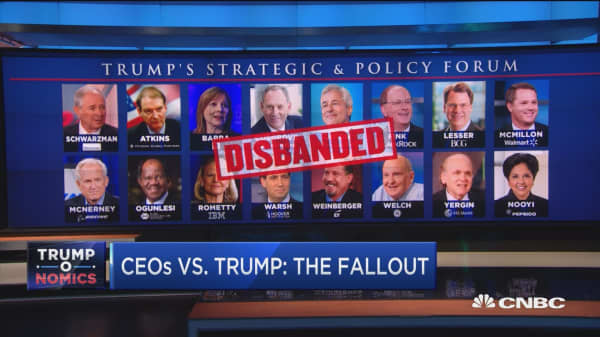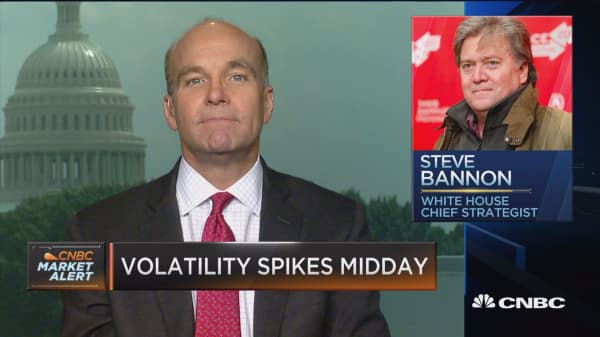In the aftermath of business leaders' rightful spurning of President Trump over his lack of moral clarity and conviction in condemning white supremacists, the fact remains: The White House still needs CEO support to drive its business agenda. Winning it back, though, will take significant and authentic change in the Trump Administration's attitude toward racist groups and social equality.
CEOs have a unique opportunity to leverage their collective influence for change in the Trump Administration. To be effective, they cannot stop applying the pressure of more CEOs going vocal and public in their opposition: Apple CEO Tim Cook, for example, issued a memo to employees, standing up against Trump's "moral equivalence between white supremacists and Nazis, and those who oppose them by standing up for human rights," and pledged $2 million in donations to groups that champion equality.
JPMorgan CEO Jamie Dimon put out a memo saying he "strongly disagree[s] with President Trump's reaction" to the deadly violence that occurred in Charlottesville, Va., last week. "Racism, intolerance and violence are always wrong."
What's significant about these two statements is they represent two huge underpinnings of the U.S. economy—technology and financial services. Now, more CEOs in more sectors need to stand up, demanding the kind of change and articulation of views that reflect American society more broadly.
Admittedly, there is significant risk for leaders to take a stand and publicly distance themselves from the leader of the free world – as Merck CEO Kenneth Frazier, one of the most prominent CEOs in the U.S., learned after he quit Trump's manufacturing council. In a statement, Frazier, an African-American, called on leaders to "honor our fundamental values by clearly rejecting expressions of hatred, bigotry, and group supremacy." Trump issued a blistering response on Twitter, saying the resignation by Frazier, who leads a pharmaceutical giant, will give him "more time to LOWER RIPOFF DRUG PRICES!"
Under Armour CEO Kevin Plank, Intel CEO Brian Krzanich, and Richard Trumka, president of the AFL-CIO, also stepped down from Trump's manufacturing council. Far too many others, including General Motors CEO Mary Barra, a member of Trump's Strategic and Policy Forum, said nothing publicly in response to Trump assigning blame to "both sides" for the Charlottesville violence.
Rather, the remaining CEOs agreed by conference call to disband the business councils. Hardly a courageous stand for those CEOs. As for Trump, "taking his toys and going home" does not mean the issue with CEOs is over. In fact, it's only just begun.
While there is risk in publicly opposing a sitting president — especially this one – CEOs must ask themselves if they can risk staying silent when their personal and moral values hang in the balance. It is not enough in this environment for CEOs to merely release boilerplate memoranda and trendy tweets decrying hate, bigotry, and racism. In many cases, their employees, communities, investors, and even families demand it.
Leaders are called upon to express and embody their own personal values just as they represent the values of their organizations. Markets are designed to be efficient, not ethical. Principled, ethical leadership has the power—and the responsibility—to inject the values of humanity, justice, and equity into the marketplace and into the public conversation. Leaders are called upon to consistently express and embody their own personal values just as they represent the values of their organizations—even at personal cost or corporate inconvenience.
Corporate leaders have both the obligation and the platform to stand up for fairness and equality in the communities from which their workforce is drawn and their products and services are sold. As corporations are increasingly drawn into the public square, these leaders should pressure the president to uphold the same ethical standards.
To take no stand or stay silent in the face of mounting evidence of such of immorality is tantamount to consent. CEOs cannot afford to appear complicit through inaction, which would be a tacit endorsement of the president, his ethics, and his agenda. As Dr. Martin Luther King Jr. said, "A man dies when he refuses to stand up for that which is right." It is time, CEOs.
Commentary by Dr. Nicholas Pearce, a clinical professor of management and organizations at Northwestern University's Kellogg School of Management and CEO of The Vocati Group. Follow him on Twitter @napphd.
For the latest commentary on markets in the U.S. and around the world, follow @CNBCopinion on Twitter.




